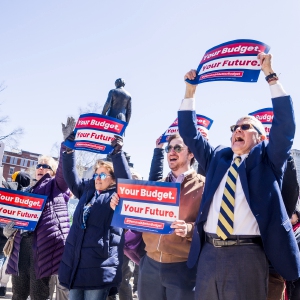Concord City Councilor Brown and Senate candidate Reardon to face ethics hearings Monday

Mayor Byron Champlin, councilors Stacey Brown, Judith Kurtz, and Jennifer Kretovic (all standing) are part of the green group in excersise in personality types at the council orientation at the Concord Community Center on Wednesday night, January 3, 2024. GEOFF FORESTER
|
Published: 09-12-2024 5:25 PM
Modified: 09-13-2024 10:45 AM |
Concord’s Board of Ethics is set to weigh a claim that City Councilor Stacey Brown, who is married to a city police officer, ran afoul of city rules by voting on a street closure that could have created a financial conflict of interest.
Later in the day Monday, another ethics board — the state’s Legislative Ethics Committee — will also meet to consider a dispute centered around Concord state Senate candidate Tara Reardon.
At the beginning of the summer, resident Tyler Savage filed a wide-ranging complaint against Brown, alleging she had violated multiple parts of the city’s ethics code and the right-to-know law.
“She ignored a conflict of interest regarding her husband’s position on the police force,” Savage wrote in his complaint. He asked that she “be held accountable for her clear disregard of rules, laws, and policies.”
The City’s Board of Ethics dismissed all but one part of the complaint, which referenced a council meeting in which Brown refused to recuse herself from a vote accepting a report from the city manager that authorized a street closure for an event. The report recommended a police detail. Several councilors and the mayor said they felt it was inappropriate for Brown to vote on the report because of the mention of police. She disagreed and participated in a unanimous vote to accept it.
Brown has previously said she did not feel the vote presented an ethical violation because her family did not stand to benefit financially from the closure of one street.
It is largely up to councilors to decide whether or not they have a conflict of interest on city items, though the mayor or other councilors can raise the issue. Brown, in her second term representing Ward 5, routinely recuses herself on votes that directly impact the police department, including contract negotiations and safety equipment grants. This year she argued she should be allowed to vote for the city budget as a whole, but her opponents on the council, who have sought to limit her participation, overruled her.
“There is a narrative that was created during the campaign that I can’t serve my constituents because I can’t vote on certain things,” Brown said in June. She views Savage’s complaint as part of that narrative.
Article continues after...
Yesterday's Most Read Articles
At ethics board hearings, both the person who filed the complaint and the city official — or their lawyer — will get to offer evidence or witnesses to help make their case. They also can ask questions of each other.
At the state level, Reardon is facing similar political battles, but many of those who support one oppose the other.
Both Reardon and Brown are facing claims that their ability to vote on certain issues is limited by the occupation of their spouses. In response, both have argued that their opponents are overplaying those limitations to convince voters that they can’t serve effectively. Both have said that they are willing to recuse themselves, but wish to participate as representatives of their constituents as much as they can.
Despite the parallels, many of Reardon’s backers include people who have clashed with Brown on this issue, namely Concord Mayor Byron Champlin, Councilors Jennifer Kretovic and Nathan Fennessy, and Brown’s challenger in the last city election, Noemi Wierwille.
Reardon’s husband Jim Bouley, a State House lobbyist and former longtime mayor of Concord, endorsed Wierwille in that election — a tight race where the candidates’ “commitment to ethics” raised tensions.
It is important to note that the two are being measured against different codes of ethics: Brown is held the city’s guidelines while Reardon is facing questions about a new law requiring recusals by lawmakers. Brown is also being challenged on a specific vote she took, while Reardon is awaiting a ruling that will determine her ability to vote in office.
The City’s ethics board doesn’t have disciplinary power, only makes a re commendation to the City Council. The Legislative Ethics Committee will at some point issue a decision on whether the new law would require Reardon to recuse herself on votes that Bouley’s firm has lobbied on.







 Comfort dog help victims, first responders process emotions
Comfort dog help victims, first responders process emotions NH law firm signs onto brief opposing Trump’s targeting of legal field
NH law firm signs onto brief opposing Trump’s targeting of legal field Ahead of House vote, Democrats rally for a ‘better budget’ to fund education, healthcare and more
Ahead of House vote, Democrats rally for a ‘better budget’ to fund education, healthcare and more Mental health funding facing House cuts, drawing concern
Mental health funding facing House cuts, drawing concern
